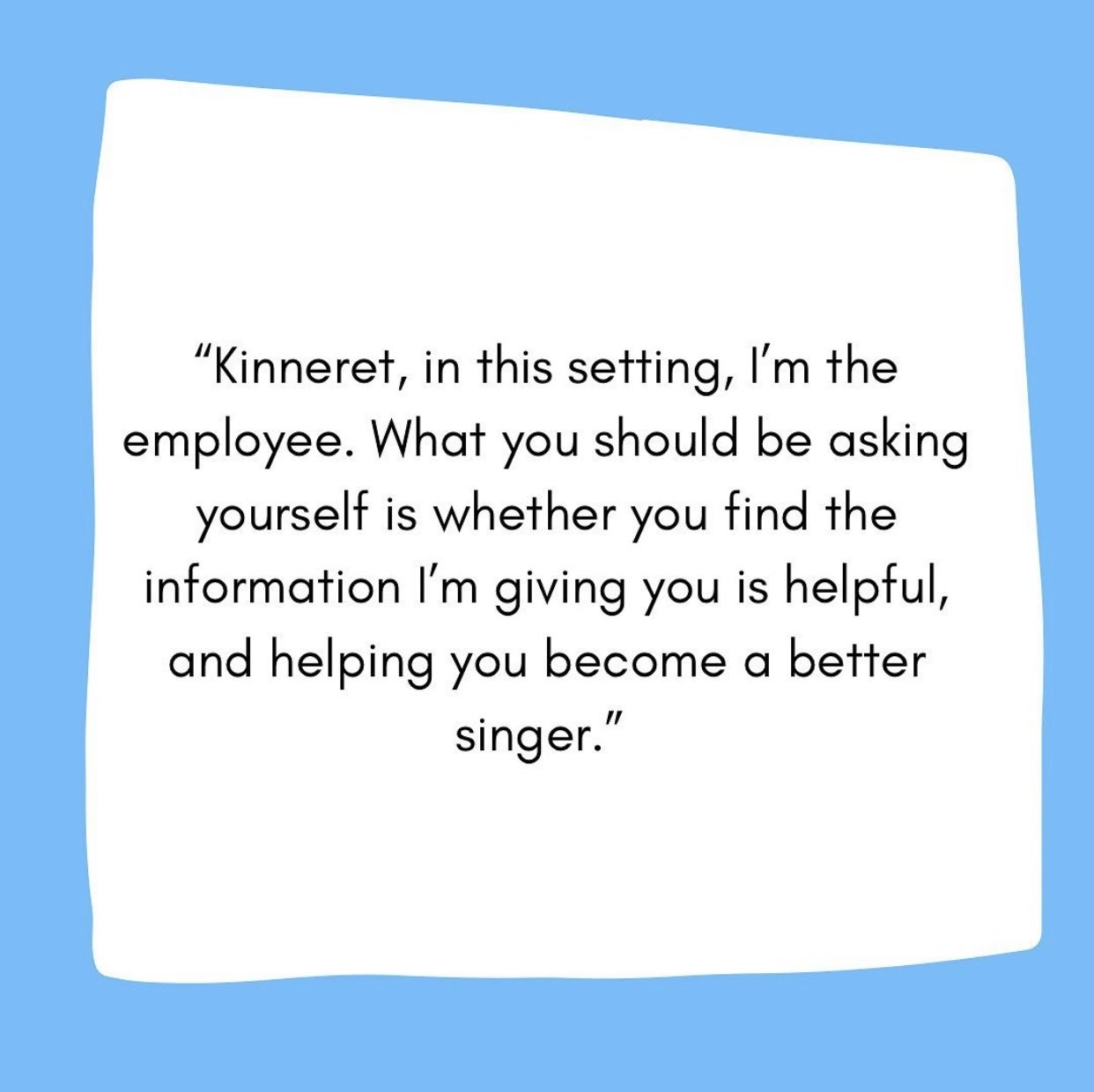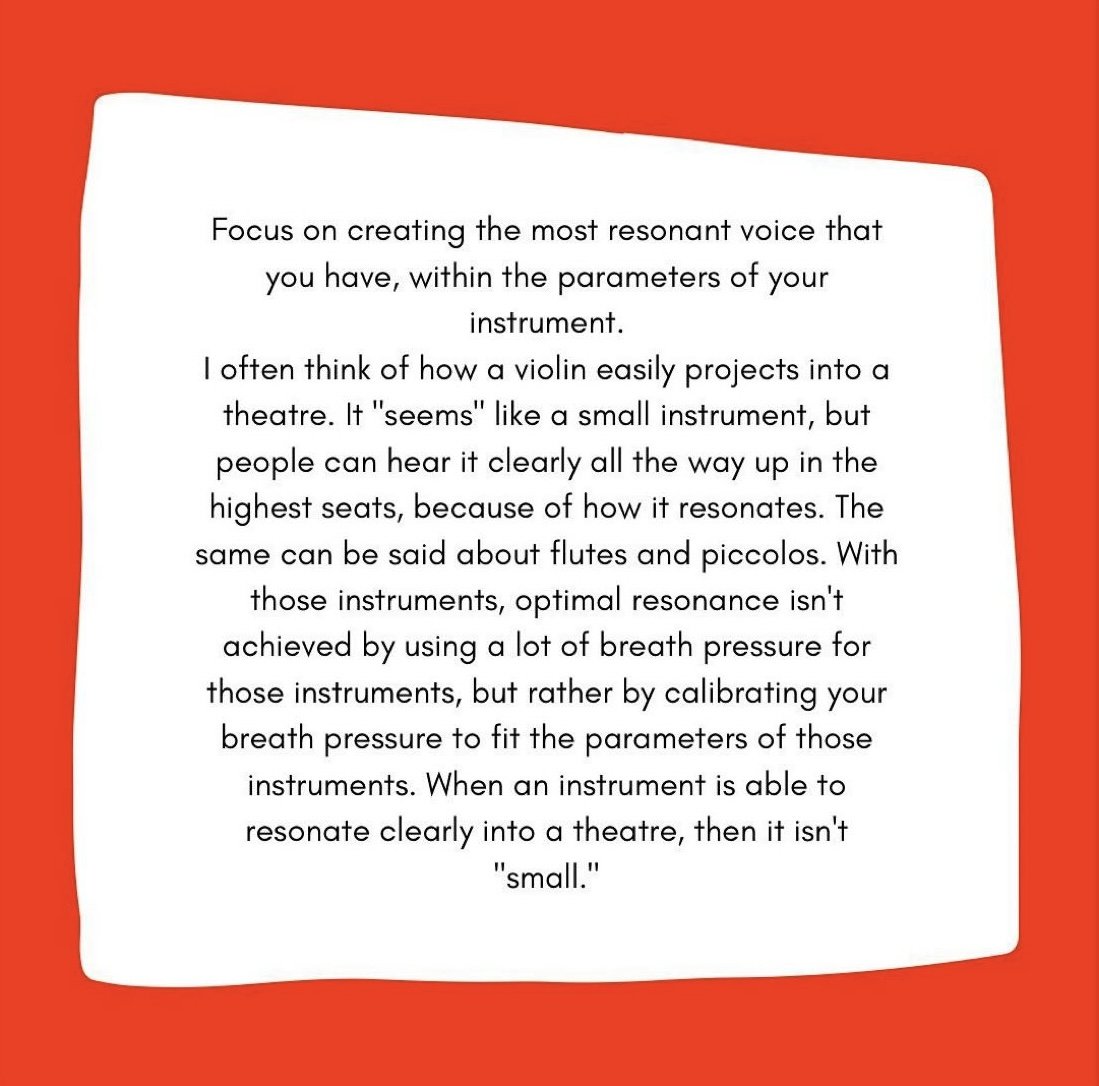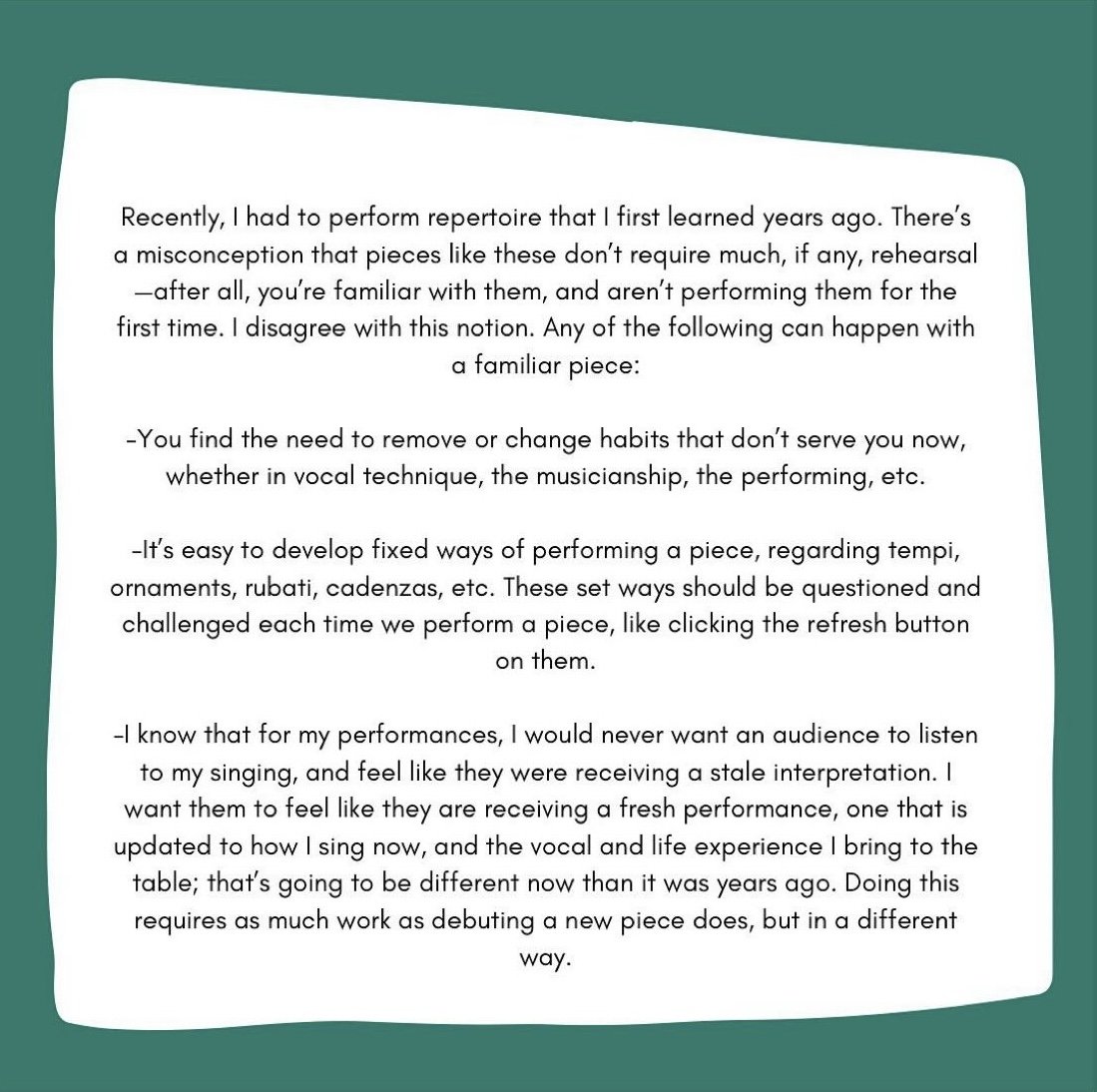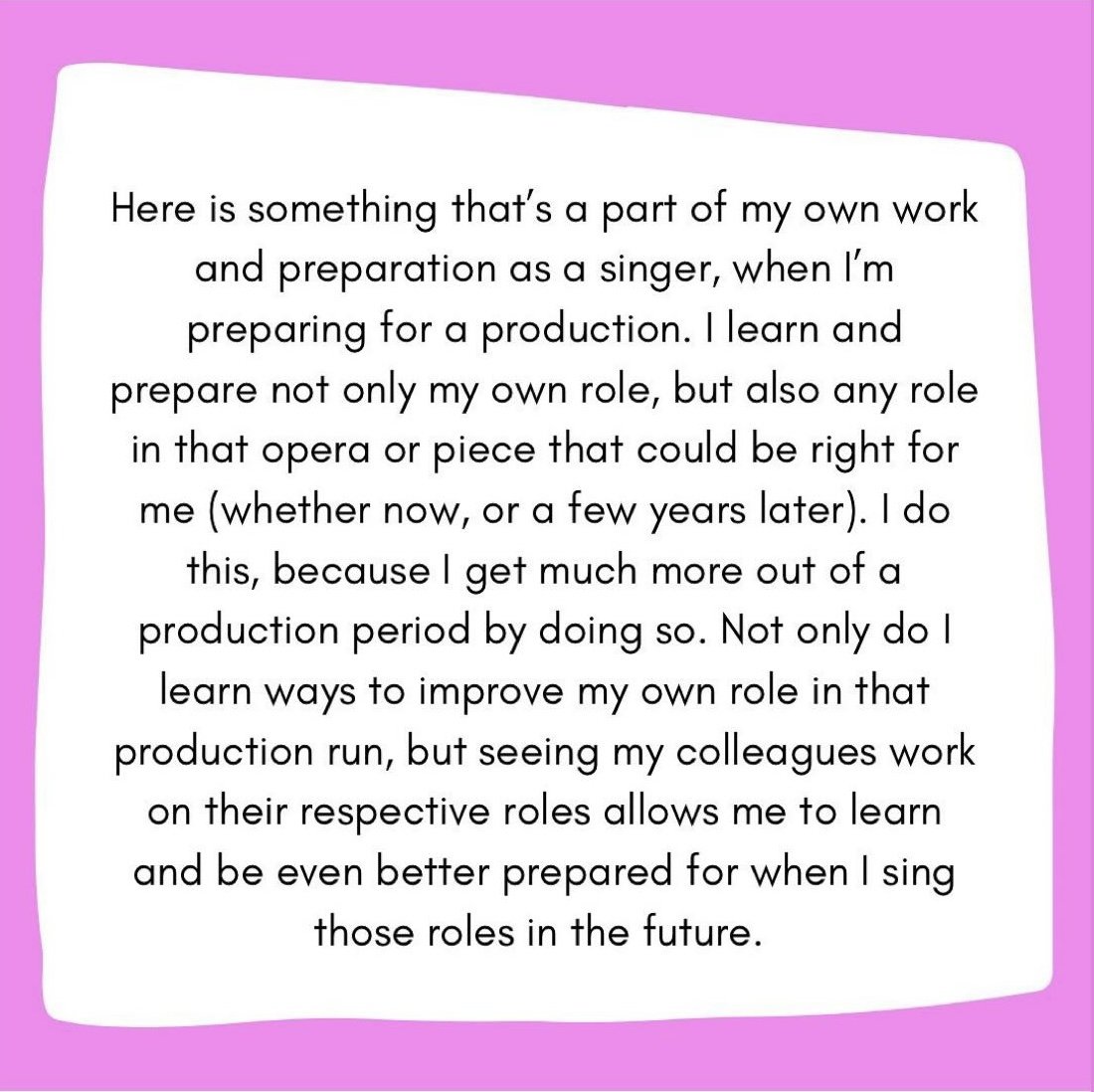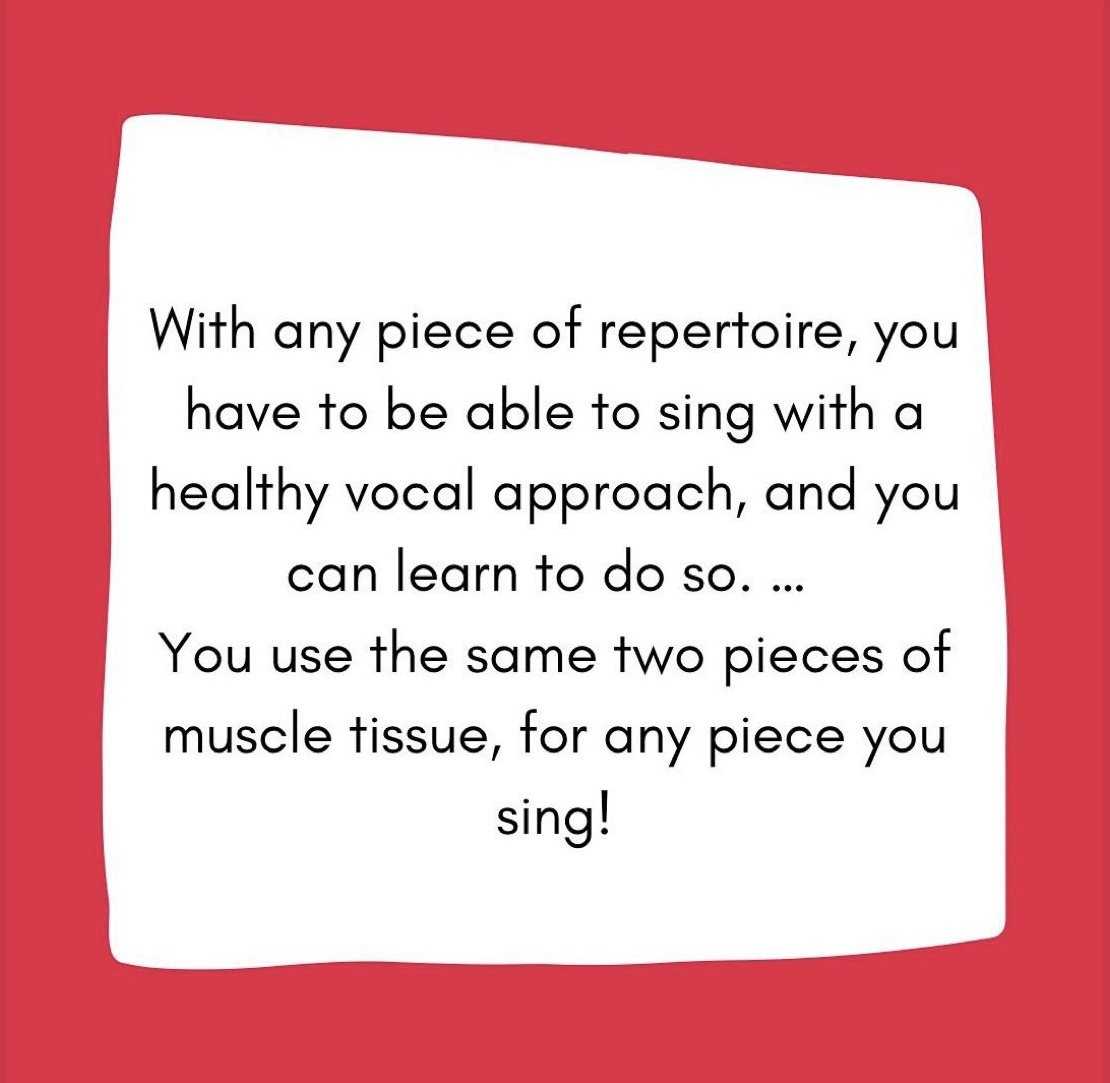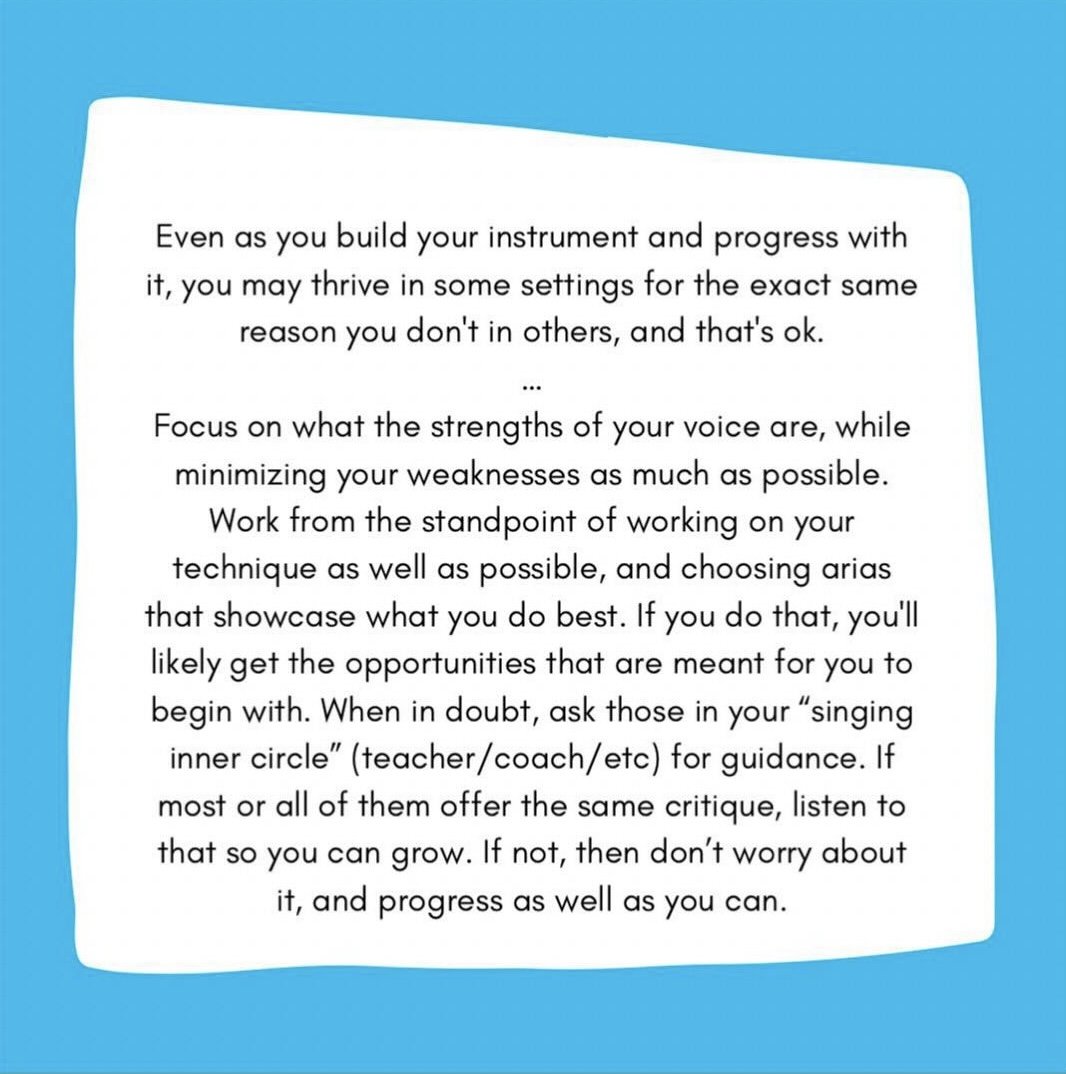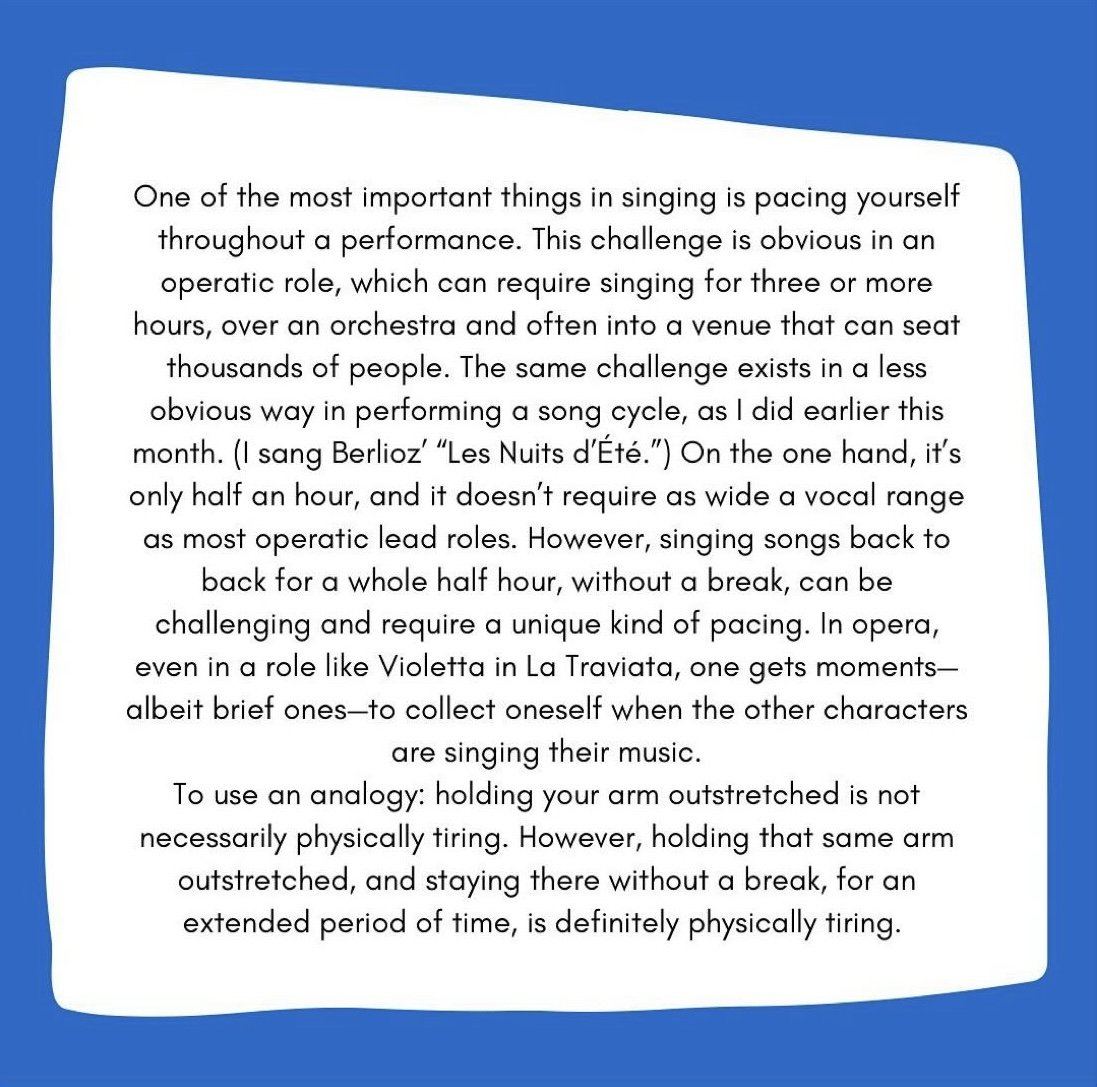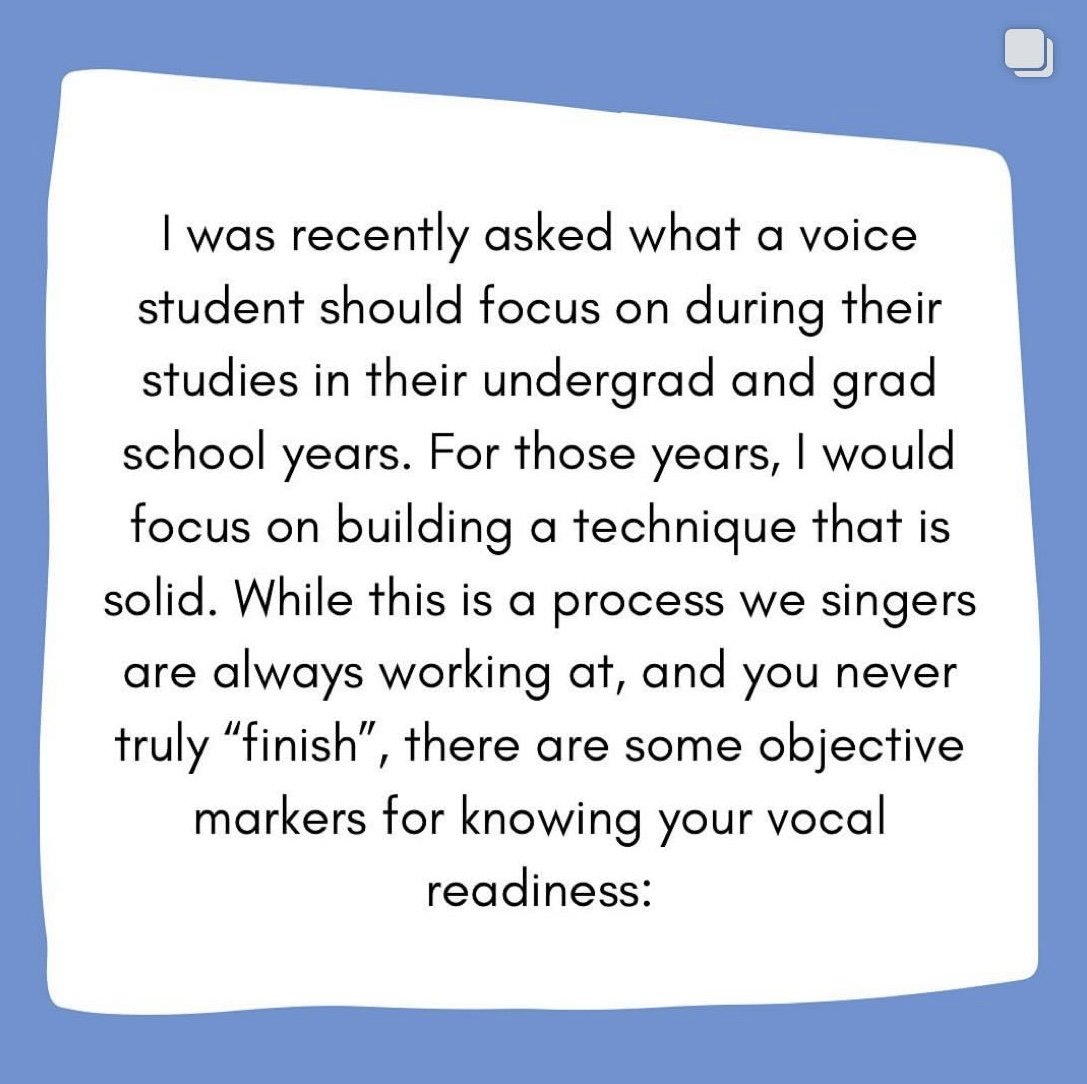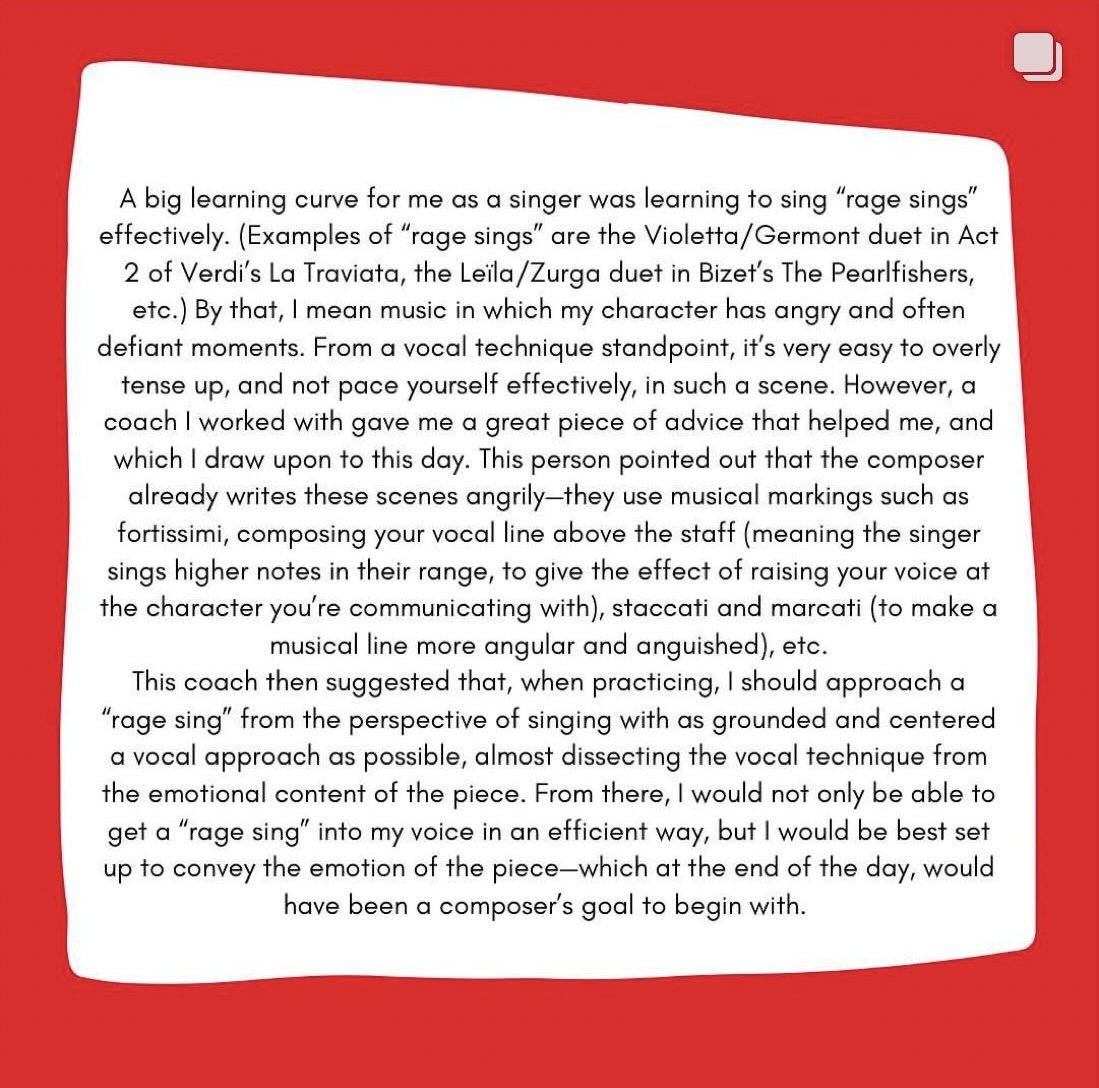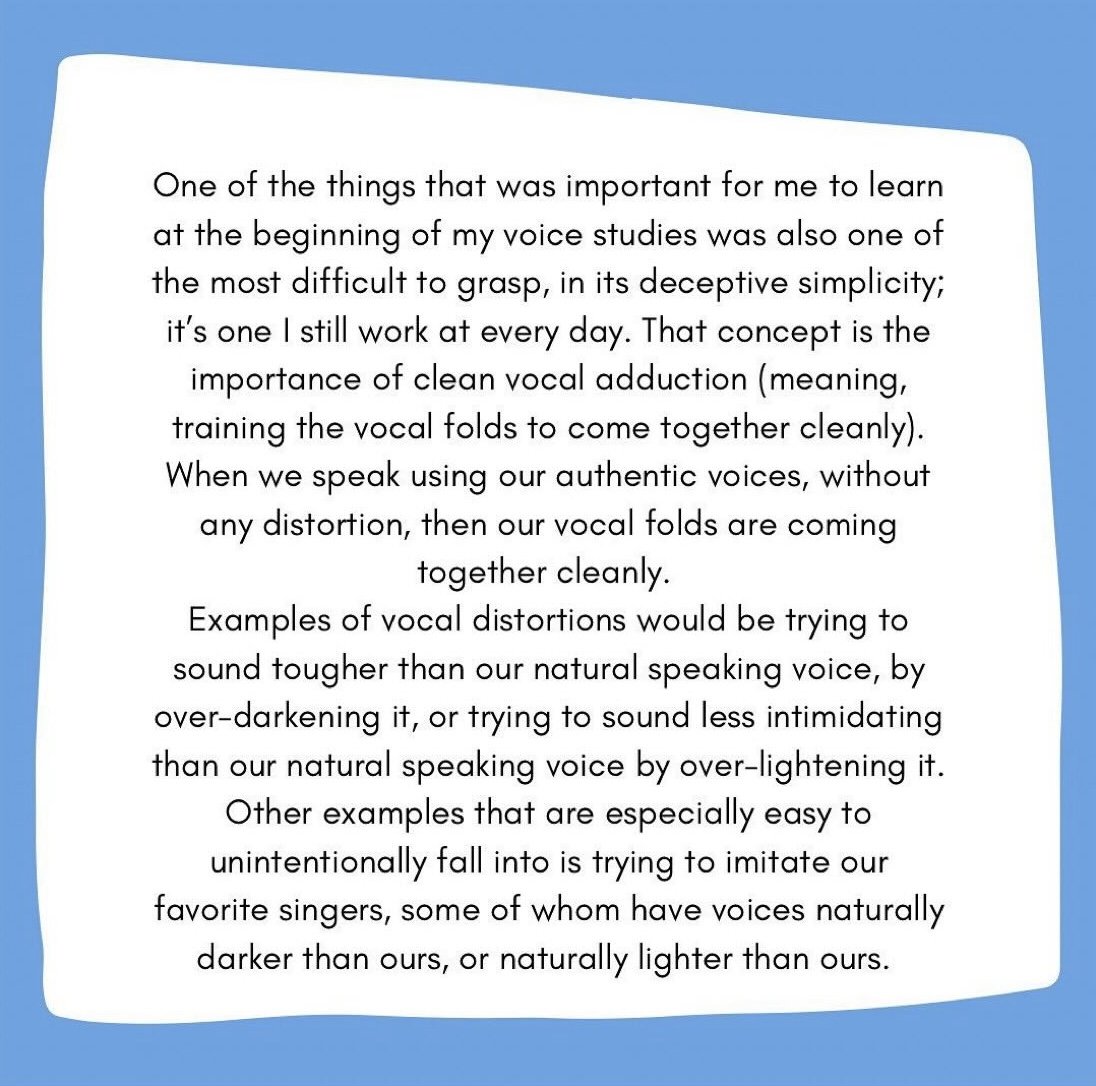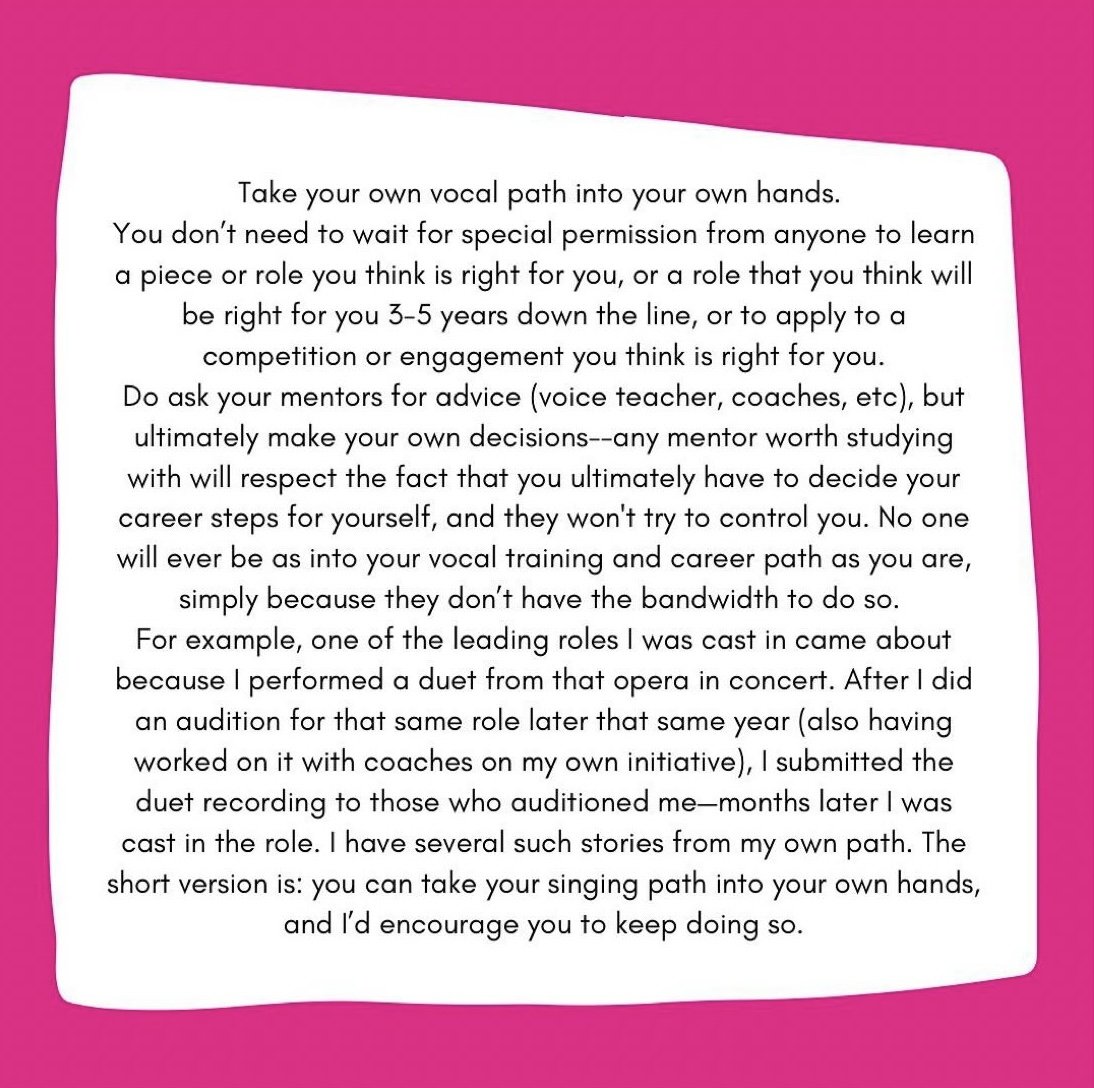To get to know me better as a teacher and singer, and see if we’re the right fit of student to teacher, here are posts of mine from my Instagram series, #TuesdayTips, in which I share information about singing:
I’ll share things related to vocal technique that I've accrued over the years: if you find something here that's helpful, great! If not, that's fine too! Because we all have different voices and bodies, there are as any different kinds of singers, as there are singers. For this reason, don't treat any piece of advice as an absolute that applies to everyone. That leads me to my first point...
Voice teachers don't teach you how to sing--they teach you to learn for yourself how to sing.
Voice lessons are places in which you receive guidance from your voice teacher. There, you get the tools to bring into the practice room, and learn how to sing. You’ll spend far more time singing in a practice room, than singing anywhere else. The best voice teachers I’ve had were those who understood that each person’s voice is different, and knew that for all their knowledge, they couldn’t possibly know anyone’s voice better than that singer knew their own. They know that a singer takes the information they give them, so they can “tailor” that to their own bodies in the practice room later, in a productive way.
I remember being in a particular lesson setting, in which I was especially worried about pleasing that teacher. I asked this person whether the way I was doing the exercises was alright. This person said to me, “Kinneret, in this setting, I’m the employee. What you should be asking yourself is whether you find the information I’m giving you is helpful, and helping you become a better singer.” That moment was so liberating, and empowered me a lot as a singer. I would encourage other singers to adopt that approach: On one hand, respect in a teacher/student relationship is something that needs to go both ways (I say this as someone who teaches, as well). At the same time, a student has every right to ask questions, to see whether the information they’re receiving is helpful, and to decide whether they feel like they’re improving in their singing.
Focus on creating the most resonant voice that you have, within the parameters of your instrument.
I often think of how a violin easily projects into a theatre. It "seems" like a small instrument, but people can hear it clearly all the way up in the highest seats, because of how it resonates. The same can be said about flutes and piccolos. With those instruments, optimal resonance isn't achieved by using a lot of breath pressure for those instruments, but rather by calibrating your breath pressure to fit the parameters of those instruments. When an instrument is able to resonate clearly into a theatre, then it isn't "small." I believe voices function similarly--you use different amounts of breath pressure, depending on whether your instrument is a flute or a clarinet; whether your voice is a lighter lyric coloratura soprano, or a fuller lyric soprano, for example.
Tailor technical principles to fit your specific instrument--when a "one-size-fits-all" approach to vocal technique is prescribed by someone, that's typically a sign that they don't know how to tailor information to a student's particular instrument and body. You wouldn't suggest the same approach to a piccolo player, that you would a french horn player, because they have two fundamentally different kinds of instruments. They will both need to tailor their use of airflow to play them, but they'll do so in entirely different ways.
Harnessing your body’s built-in resonance is also the key to tailoring your voice to fit different roles, especially in singing repertoire that has a reputation for being “bigger.” I’m now stepping my toes little by little into such “bigger” rep as my voice is gaining heft, and I’m regularly advised to sing it like I would sing the rep I already sing now. Why? Because I’ve already tapped into my body’s resonance in that older rep—if I apply that same approach to newer rep that is more heavily orchestrated, then I will set myself up best to succeed in that new rep.
Recently, I had to perform repertoire that I first learned years ago. There’s a misconception that pieces like these don’t require much, if any, rehearsal—after all, you’re familiar with them, and aren’t performing them for the first time. I disagree with this notion. Any of the following can happen with a familiar piece:
-You find the need to remove or change habits that don’t serve you now, whether in vocal technique, the musicianship, the performing, etc.
-It’s easy to develop fixed ways of performing a piece, regarding tempi, ornaments, rubati, cadenzas, etc. These set ways should be questioned and challenged each time we perform a piece, like clicking the refresh button on them.
-I know that for my performances, I would never want an audience to listen to my singing, and feel like they were receiving a stale interpretation. I want them to feel like they are receiving a fresh performance, one that is updated to how I sing now, and the vocal and life experience I bring to the table; that’s going to be different now than it was years ago. Doing this requires as much work as debuting a new piece does, but in a different way.
Here is something that’s a part of my own work and preparation as a singer, when I’m preparing for a production. I learn and prepare not only my own role, but also any role in that opera or piece that could be right for me (whether now, or a few years later). I do this, because I get much more out of a production period by doing so. Not only do I learn ways to improve my own role in that production run, but seeing my colleagues work on their respective roles allows me to learn and be even better prepared for when I sing those roles in the future.
When teaching voice, I’ve been asked by students whether I think they’re a soprano/a mezzo/etc. I tell them that fixating on such a label, at the expense of cultivating a solid vocal technique, is counterproductive. A solid vocal technique should allow one to consistently sing well throughout their vocal registers (low, high, passaggio/passages, etc), blend those registers smoothly, sing with dynamics, and project on the basis of support.
I avoid slapping labels on people, because the priority should be on making sure a person grows their technique in a way that optimally fits their instrument at any given time. I’ve experienced this kind of “early slapping labels” myself as a singer—in my experience, it’s a red flag, because that tells me that the teacher is trying to pigeonhole you into a box, at the expense of building a solid technique; focusing on a label before even building good vocal technique is putting the cart before the horse. Also, by focusing simply on growing your technique, you expand the possibilities as to what you can do with your voice. By extension, more questions might be raised as to whether you’re a soprano, a mezzo, or [insert-label-here], another thing I’ve experienced multiple times in my own vocal journey.
One of my friends, who also teaches voice, said that fundamentally, there isn’t much of a difference between soprano and mezzo voices, with the exception of the extremes of the female voice: high flying coloraturas that sing roles like Zerbinetta (Strauss’ Ariadne auf Naxos), and contraltos who sing Erda (Wagner’s Ring Cycle). I agree completely.
After building a solid technique, the market and people casting you will tell you how they see you. How they see you may also change over time—for example, earlier on, I was repeatedly cast in and advised to focus on repertoire like Violetta, Rosina, Gilda, Lucia, etc, as it combined what my voice does best: combining my rich middle voice, with coloratura agility and high notes. As my middle voice has been filling in even more lately, I’ve been cast in and advised repeatedly to consider roles like Giulio Cesare, Cenerentola, Sesto (La Clemenza di Tito), etc—repertoire that still combines a rich middle voice, with coloratura and an extension (or ornaments that highlight higher notes, in the case of Cesare). I’ve repeatedly credited my success in traditionally-mezzo repertoire to my training in soprano repertoire: my soprano training, and its focus on soft palate lift, has been key to my success in mezzo repertoire, because that “soprano focus on the soft palate” enabled me to have especially resonant and healthy low notes. Also, careful calibration of vocal fold adduction (using a minimum amount of airflow) all throughout my vocal range (especially in the highest notes) has been critically important in my success in the soprano roles/pieces I've sung. Applying these same principles to mezzo repertoire has been crucially important, as well -- as far as the application of such vocal technique principles, soprano and mezzo repertoire are not different from each other.
Don’t slap a label on yourself before you’ve even developed a solid technique. And don’t study with someone who is fixated on slapping a label on you, especially when starting to train with them.
On a related, but separate note: we voice teachers don’t teach people how to sing—we teach people to learn for themselves how to sing. Our goal should be to give a person the tools to unlock their unique instrument, both in the voice studio and most of all in the practice room, where a person will spend most of their time singing. Any teacher worth their salt will recognize that each person’s singing journey will be different, and that that person will ultimately need to navigate their singing path on their own terms. Never study with someone who thinks they know your voice and vocal journey better than you know your own.
I don’t believe the idea, that one has to sing a particular piece of rep, or sing pieces by a certain composer, in order to learn how to sing.
I personally never liked the 24 Italian art songs (*unpopular classical voice opinion, I know!* ). While they can be good tools through which to learn to sing legato, they aren't the only ones. Classical vocal music is a field that has 400+ years' worth of beautiful music. It’s possible to find other pieces that you love, and through which you can learn basic principles of vocal technique. When I built my voice back in undergrad, I used Tosti and Verdi songs to learn basics of vocal technique, such as learning to sing legato. (Verdi's songs aren't nearly as well-known as his arias, but they're beautiful and expressive pieces well-worth knowing.)
Also, I don't believe that a piece of repertoire in and of itself can cause vocal problems. With any piece of repertoire, you have to be able to sing with a healthy vocal approach, and you can learn to do so. To paraphrase something my voice teacher says "You use the same two pieces of muscle tissue, for any piece you sing!" In other words, if you have trouble negotiating a vocal challenge in one aria, then that same vocal problem will appear in another aria that has that same vocal challenge. If you solve a problem with that area of your voice in one piece, then you have the tools to solve it in every other piece that you sing.
For example, singing Mozart with problematic technique can exacerbate those holes in vocal technique if they’re not addressed, despite his music having the reputation for being healthy. To use a fitness analogy here: Pilates is widely considered to be a healthy form of exercise. However, if you don’t check that you’re doing the Pilates exercises correctly, then you could risk injuring yourself, or exacerbating injuries you already have. (The same can be said about all forms of exercise, of course.)
Verdi and Wagner can help a singer grow exponentially, if the technical work they do while learning the piece is beneficial. For this reason, I find the idea of a composer’s music inherently being “healthy,” and another’s being a “voice killer” to be misguided. So long as you’re receiving optimal training that helps you harness your unique voice, then you can learn to sing a piece healthily. That’s what the great composers would have wanted, anyway.
Even as you build your instrument and progress with it, you may thrive in some settings for the exact same reason you don't in others, and that's ok.
During my undergrad and grad school years, I was advised that competitions likely wouldn’t be optimal settings for me to stand out in—settings that rely on everyone in the jury advancing you in the competition. However, I was told I would be cast in leading roles for precisely that same reason: combining a strong middle voice, with coloratura and extension (high notes). That’s exactly what has come to pass; at feedback sessions after competitions, some panelists would tell me they thought I was a mezzo (because of my low notes), and others on that same panel would tell me they thought I should be singing high-flying repertoire like Zerbinetta and Queen of the Night (because of my high notes).
Indeed, I got cast in leading roles for the same reason that I didn’t thrive in competition settings: the roles I've been cast in require both a strong middle voice, and high notes plus coloratura: Violetta, Rosina, Gilda, and Madame Cortese (in Rossini’s Il Viaggio a Reims).
Focus on what the strengths of your voice are, while minimizing your weaknesses as much as possible. Work from the standpoint of working on your technique as well as possible, and choosing arias that showcase what you do best. If you do that, you'll likely get the opportunities that are meant for you to begin with. When in doubt, ask those in your “singing inner circle” (teacher/coach/etc) for guidance. If most or all of them offer the same critique, listen to that so you can grow. If not, then don’t worry about it, and progress as well as you can.
(Another note: Even if your path in singing resembles mine, in this respect, I would still encourage you to still do competitions--not necessarily to win, but to be heard. I've had live audition invitations and other opportunities materialize because someone on the jury or in the audience liked what they heard, even if I didn't even pass to the next round of that competition.)
One of the most important things in singing is pacing yourself throughout a performance. This challenge is obvious in an operatic role, which can require singing for three or more hours, over an orchestra and often into a venue that can seat thousands of people. The same challenge exists in a less obvious way in performing a song cycle, as I did earlier this month. (I sang Berlioz’ “Les Nuits d’Été.”) On the one hand, it’s only half an hour, and it doesn’t require as wide a vocal range as most operatic lead roles. However, singing songs back to back for a whole half hour, without a break, can be challenging and require a unique kind of pacing. In opera, even in a role like Violetta in La Traviata, one gets moments—albeit brief ones—to collect oneself when the other characters are singing their music.
To use an analogy: holding your arm outstretched is not necessarily physically tiring. However, holding that same arm outstretched, and staying there without a break, for an extended period of time, is definitely physically tiring.
I was recently asked what a voice student should focus on during their studies in their undergrad and grad school years. For those years, I would focus on building a technique that is solid. While this is a process we singers are always working at, and you never truly “finish”, there are some objective markers for knowing your vocal readiness:
-being able to sing a full recital/concert program with vocal endurance/stamina. (Not hoarse/fatigued/etc by the end of the performance or rehearsal.)
-being able to sing a full operatic role with vocal endurance/stamina. (Not hoarse/fatigued/etc by the end of the performance or rehearsal.)
-being able to sing in a hall of 2,000+ people without a microphone and over an orchestra with minimal vocal strain.
-having a solid understanding of vocal fold adduction, chest and head voice (and passaggi), low/middle/high notes, vocal agility, how to sing dynamics, etc.
-having a vocal technique that can serve you in any number of situations—being able to make the vocal adjustments needed to maintain your vocal technique on a daily basis without having to check in with your voice teacher regularly e.g. once a week or more. Once you get past the master’s degree level or so, you should be able to be vocally self-sufficient (at least for the most part). All of the best teachers I’ve had wanted to empower me to be as vocally self-sufficient as possible, and not have to depend on them.
Also: Learn your languages! This is an optimal time in your studies to gain as much fluency in the languages you are singing in and will be working in as possible. Learning languages speeds up the time in which you learn repertoire, and makes your performances much more truthful in your delivery of the text. It’s also likely you’ll be using those languages to communicate with directors and conductors—for example, the first director I worked with in my first job out of grad school was someone with whom I spoke in Italian, since not everyone will prefer to communicate in English.
I believe coloratura, lows/middles/highs, chest voice/head voice, negotiating the primo and secondo passaggi, messa di voce, etc are all essential components of a healthy vocal technique.
Even if one doesn't eventually specialize in music with coloratura, e.g. Wagner and Puccini, it will be important to keep your voice flexible with coloratura, within the parameters of one’s instrument. In Anthony Tommasini’s New York Times article “Nilsson in Person: The Glory of the Power,” he recounts the following: “[Nilsson] knew she was not the most subtle Mozart singer. But she wanted to maintain some lightness and lyricism in her voice as she soldiered on with the weighty Wagner repertory that the international opera world depended upon her to sing. … Ms. Nilsson once said, "… I know I haven't been very good to Mozart, but Mozart has been very good to me."”
Don’t get me wrong: I’m not a believer in Mozart being an inherently “healthy” composer to sing. (See my previous post above about this.) I share this story, because it struck me how even a singer so renowned for her Wagner (and also Puccini’s Turandot) understood the need to keep flexibility in her voice, in order to own those roles as she did. Vocal flexibility is a necessity for negotiating the large interval leaps in Wagner and Puccini, and for the trill that is written in the Hojotoho (in Wagner’s Die Walküre.) Conversely, the freedom and release that comes from singing later 19th century repertoire and on, can help give a healthy baseline for breath support for much more instrumentally-written vocal phrases, like those of Mozart and Handel; maintaining a happy medium between having vocal agility, without coming off your voice, is important in that repertoire.
A big learning curve for me as a singer was learning to sing “rage sings” effectively. (Examples of “rage sings” are the Violetta/Germont duet in Act 2 of Verdi’s La Traviata, the Leïla/Zurga duet in Bizet’s The Pearlfishers, etc.) By that, I mean music in which my character has angry and often defiant moments. From a vocal technique standpoint, it’s very easy to overly tense up, and not pace yourself effectively, in such a scene. However, a coach I worked with gave me a great piece of advice that helped me, and which I draw upon to this day. This person pointed out that the composer already writes these scenes angrily—they use musical markings such as fortissimi, composing your vocal line above the staff (meaning the singer sings higher notes in their range, to give the effect of raising your voice at the character you’re communicating with), staccati and marcati (to make a musical line more angular and anguished), etc.
This coach then suggested that, when practicing, I should approach a “rage sing” from the perspective of singing with as grounded and centered a vocal approach as possible, almost dissecting the vocal technique from the emotional content of the piece. From there, I would not only be able to get a “rage sing” into my voice in an efficient way, but I would be best set up to convey the emotion of the piece—which at the end of the day, would have been a composer’s goal to begin with.
One of the things that was important for me to learn at the beginning of my voice studies was also one of the most difficult to grasp, in its deceptive simplicity; it’s one I still work at every day. That concept is the importance of clean vocal adduction (meaning, training the vocal folds to come together cleanly). When we speak using our authentic voices, without any distortion, then our vocal folds are coming together cleanly.
Examples of vocal distortions would be trying to sound tougher than our natural speaking voice, by over-darkening it, or trying to sound less intimidating than our natural speaking voice by over-lightening it. Other examples that are especially easy to unintentionally fall into is trying to imitate our favorite singers, some of whom have voices naturally darker than ours, or naturally lighter than ours.
However, clean vocal fold adduction in one’s chest voice (the vocal register around where we speak) is the foundation for being able to sing cleanly and healthily all throughout the rest of our range, especially in high notes (the "roof," if I liken the chest voice to being the "foundation.")
Vocal injuries, like vocal nodes and polyps, can often be caused (though not always) by the vocal folds not adducting cleanly, and sustaining such-repeated vocal adductions over an extended period of time—when whispering, for example, the vocal folds don’t come together cleanly, making it one of the worst things you could do to your voice.
Italian speech is the foundation for which to learn this clean vocal adduction, in a way that's uniquely suited to the demands of operatic singing. As the legendary voice teacher Giovanni Battista Lamperti said in his book, "The Technics of Bel Canto, "The Italian language... is one of the best adapted [languages] for artistic song on account of its wealth of vowels and lack of aspirates." Meaning, the Italian language, with its vowels and lack of aspirated consonants--consonants that by nature expulse air--is an ideal language for singing. The Italian language is naturally suited to train one's vocal folds to adduct cleanly, and to expulse the minimum amount of airflow possible, in a way that's calibrated to each person's individual vocal folds. It's not by chance that the art form of opera was born in Italy, even as it eventually came to be sung in many other languages.
More to come, in my experiences building on this concept in the practice room, and how this concept of clean vocal fold adduction informs the rest of my own technique. Of course, nothing that I write here replaces one-on-one instruction with a qualified voice teacher. No one approach to singing works for everyone, any more than one health/fitness/diet regimen would work for everyone--it's deeply personal to each singer. On this note, I'll quote another thing Lamperti said: "Each voice is a law unto itself."
Take your own vocal path into your own hands.
You don’t need to wait for special permission from anyone to learn a piece or role you think is right for you, or a role that you think will be right for you 3-5 years down the line, or to apply to a competition or engagement you think is right for you.
Do ask your mentors for advice (voice teacher, coaches, etc), but ultimately make your own decisions--any mentor worth studying with will respect the fact that you ultimately have to decide your career steps for yourself, and they won't try to control you. No one will ever be as into your vocal training and career path as you are, simply because they don’t have the bandwidth to do so.
For example, one of the leading roles I was cast in came about because I performed a duet from that opera in concert. After I did an audition for that same role later that same year (also having worked on it with coaches on my own initiative), I submitted the duet recording to those who auditioned me—months later I was cast in the role. I have several such stories from my own path. The short version is: you can take your singing path into your own hands, and I’d encourage you to keep doing so.
